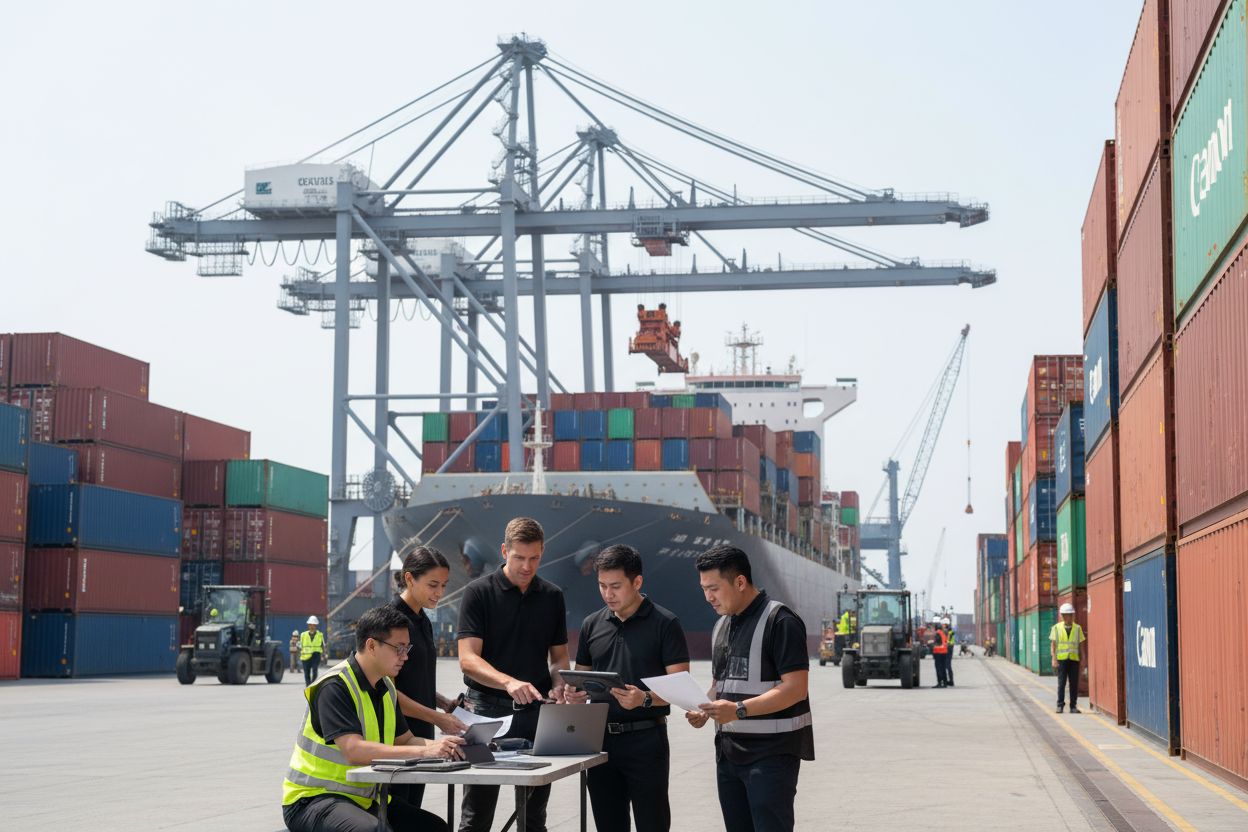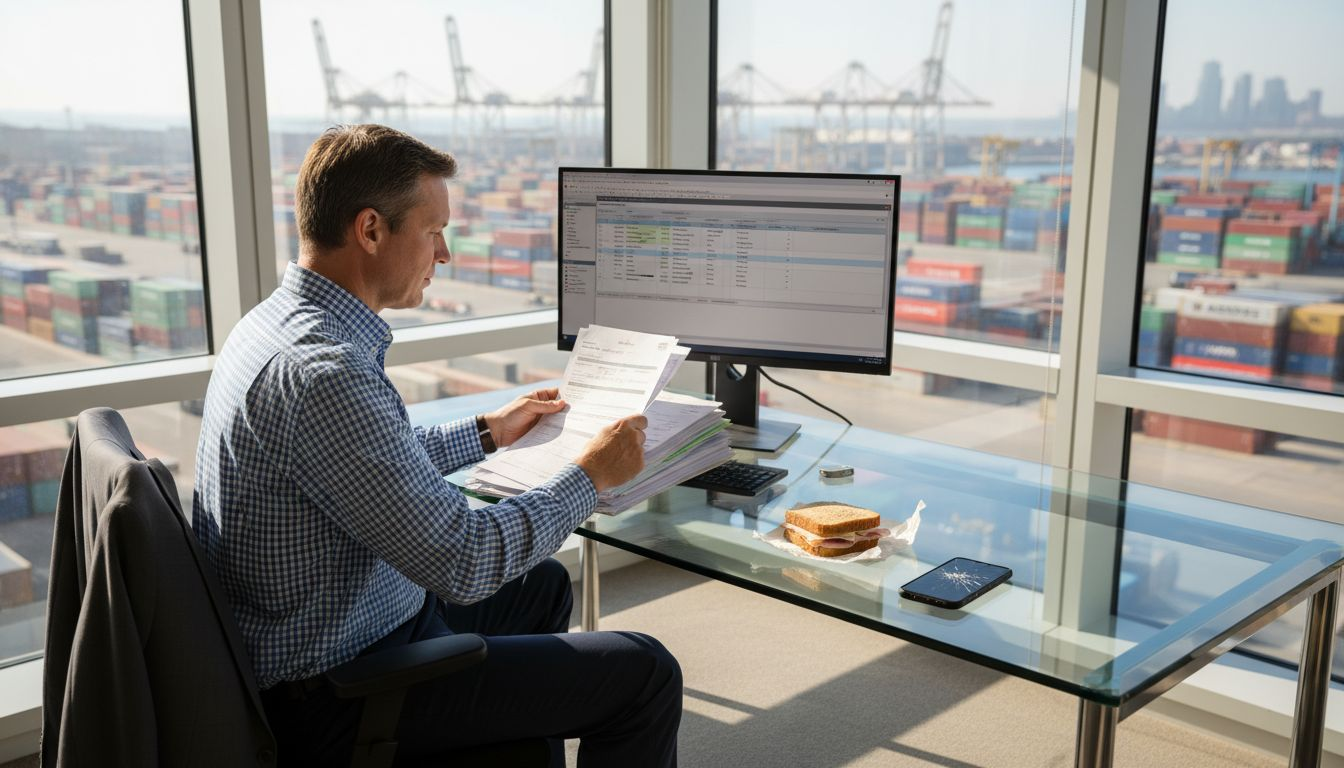Import cargo insurance sounds like a dry paperwork detail, but it is the backbone of every secure international shipment. Nearly $50 billion worth of goods are lost or damaged in transit globally every year. Most people think the biggest risk is storms at sea or hijackings, but the real surprises come from everyday mishaps like warehouse fires or even a forklift gone wrong. It is the hidden risks you never consider that can sink your business if you are not prepared.
Table of Contents
- Understanding Import Cargo Insurance Basics
- All-Risk Coverage: The Most Comprehensive Option
- Named Perils Coverage: Specific Risks Covered
- Voyage Policy: Ideal for Single Trips
- Open Cargo Policy: For Frequent Importers
- Excess Liability Insurance: Extra Protection
- Choosing the Right Insurance: Key Considerations
Quick Summary
| Takeaway | Explanation |
|---|---|
| Cargo insurance is essential for importers. | It protects businesses from financial loss during international transportation of goods, covering physical damage and total loss. |
| All-risk coverage offers the broadest protection. | This comprehensive insurance safeguards against nearly all shipping risks, reducing financial exposure for importers. |
| Named perils coverage is cost-effective. | By covering only specific listed risks, it allows businesses to focus on tailored insurance based on their unique shipping vulnerabilities. |
| Voyage policies benefit infrequent shippers. | Ideal for one-time shipments, these policies provide targeted coverage tailored to specific journeys without long-term commitments. |
| Excess liability insurance offers extra financial security. | This coverage supplements standard policies, protecting businesses from high-value shipment risks beyond their basic insurance limits. |
1: Understanding Import Cargo Insurance Basics
Import cargo insurance represents a critical financial protection mechanism for businesses engaged in international trade. When goods are transported across borders, they face numerous potential risks that could result in significant financial losses. Cargo insurance provides a safety net against unexpected events that might compromise the value and integrity of shipped merchandise.
At its core, import cargo insurance is designed to shield importers from financial damage during transportation. This protection covers a wide range of scenarios, from physical damage to complete cargo loss. Learn more about freight insurance fundamentals to understand how these policies safeguard your business investments.
Key considerations for import cargo insurance include:
- Comprehensive coverage for goods during international transit
- Protection against potential damages from transportation mishaps
- Financial compensation for lost or damaged shipments
- Mitigation of unexpected economic risks in global trade
The complexity of international shipping demands a nuanced approach to risk management. Different transportation modes – maritime, air, and ground – present unique challenges that require specialized insurance coverage. Understanding these variations helps businesses select appropriate insurance types that match their specific shipping requirements.
Successful import cargo insurance strategies involve carefully evaluating potential risks, understanding policy details, and choosing coverage that aligns with your specific trade activities. Importers must assess factors like cargo type, transportation route, shipping method, and potential environmental or geopolitical risks when selecting insurance protection.
Professional logistics experts recommend treating cargo insurance not as an optional expense, but as a fundamental component of responsible international trade risk management. By investing in robust insurance coverage, businesses can protect their financial interests and maintain operational stability in an unpredictable global marketplace.
2: All-Risk Coverage: The Most Comprehensive Option
All-risk coverage represents the gold standard in import cargo insurance, offering businesses the most extensive protection against potential shipping-related losses. Unlike more limited insurance types, this comprehensive policy provides a robust financial safeguard that covers almost every conceivable transportation risk.
According to International Maritime Bureau research, all-risk coverage is particularly critical in international trade, where goods traverse complex and unpredictable shipping routes. This insurance type protects importers from a broad spectrum of potential damages and losses that could otherwise devastate a company’s financial standing.
Key characteristics of all-risk coverage include:
- Comprehensive protection against most shipping-related risks
- Flexible coverage for diverse cargo types and transportation modes
- Higher premium costs balanced by extensive risk mitigation
- Minimal exclusions compared to other insurance types
Businesses selecting all-risk coverage benefit from its expansive protection framework. The policy typically covers unexpected events such as:
- Natural disasters during transportation
- Mechanical failures
- Theft and criminal activities
- Accidental damage
- Improper handling
While all-risk coverage offers the most extensive protection, importers must carefully review specific policy details. Each insurance contract contains unique terms and potential exclusions that require thorough examination. Some policies might exclude certain high-risk scenarios or require additional riders for complete protection.
The decision to choose all-risk coverage depends on multiple factors, including cargo value, transportation complexity, and potential financial exposure. Understand more about comprehensive freight protection to make informed insurance selections that align with your specific business needs.
Professional logistics experts recommend all-risk coverage for businesses transporting high-value or sensitive merchandise across international borders. By investing in this comprehensive insurance type, companies can effectively transfer potential transportation risks and maintain financial stability in an increasingly complex global trade environment.
3: Named Perils Coverage: Specific Risks Covered
Named perils coverage provides targeted insurance protection for importers by explicitly listing and covering specific, predetermined risks during international cargo transportation. This targeted approach offers a more economical alternative to comprehensive all-risk policies, allowing businesses to customize their insurance strategy based on precise shipping requirements.
According to International Trade Administration research, named perils coverage enables importers to strategically manage their risk exposure while maintaining financial flexibility. By defining exact scenarios of protection, businesses can create tailored insurance solutions that match their unique shipping challenges.
Typical named perils typically include:
- Collision or overturning of transportation vehicle
- Fire and lightning damage
- Explosion and unexpected mechanical breakdown
- Natural disasters like hurricanes or earthquakes
- Theft and vandalism during transit
Key considerations for named perils coverage involve understanding the precise language and limitations within the insurance contract. Unlike all-risk policies, these specialized plans require meticulous review to ensure comprehensive protection against potential shipping disruptions.
Businesses selecting named perils coverage must carefully evaluate their specific transportation risks. Learn more about freight insurance fundamentals to understand how different coverage types align with unique shipping requirements.
Factors influencing named perils insurance selection include:
- Cargo type and inherent transportation vulnerabilities
- Historical shipping routes and potential risk zones
- Frequency and value of international shipments
- Specific industry transportation challenges
While named perils coverage offers a more budget-friendly insurance option, importers must conduct thorough risk assessments. The limited scope of protection means businesses assume responsibility for risks not explicitly mentioned in the policy. Professional logistics experts recommend a comprehensive evaluation of potential shipping challenges before selecting this insurance approach.
By understanding the nuanced protection offered through named perils coverage, importers can develop strategic insurance solutions that balance comprehensive risk management with financial efficiency.
4: Voyage Policy: Ideal for Single Trips
Voyage policies represent a specialized import cargo insurance solution designed specifically for businesses conducting infrequent or one-time international shipments. This targeted insurance approach provides precise protection for a single transportation journey, offering flexibility and cost-effectiveness for companies with occasional international trade activities.
According to International Chamber of Shipping, voyage policies are particularly advantageous for smaller businesses or enterprises conducting irregular international shipments. These policies allow importers to secure comprehensive coverage for a specific transportation route without committing to long-term insurance contracts.
Key characteristics of voyage policies include:
- Time-limited coverage for a single transportation journey
- Precise risk protection matching specific shipment requirements
- Flexible pricing based on individual trip parameters
- Minimal administrative complexity
Voyage policies provide strategic benefits for businesses with unique shipping needs. By focusing protection on a single trip, importers can customize their insurance approach to match exact transportation risks and cargo specifications.
Factors influencing voyage policy selection involve:
- Cargo type and inherent transportation vulnerabilities
- Specific shipping route and potential risk zones
- Total shipment value and potential financial exposure
- Frequency of international transportation activities
Understand more about comprehensive freight protection to evaluate whether a voyage policy aligns with your specific business requirements. Professional logistics experts recommend carefully assessing potential risks and transportation challenges before selecting this insurance approach.
The primary advantage of voyage policies lies in their ability to provide targeted, cost-effective coverage for businesses with irregular shipping activities. Unlike blanket insurance policies, these specialized contracts enable importers to secure precise protection tailored to individual transportation needs.
Businesses considering voyage policies must conduct thorough risk assessments and understand the specific limitations of single-trip coverage. While these policies offer significant flexibility, they require meticulous planning and a comprehensive understanding of potential shipping challenges.
5: Open Cargo Policy: For Frequent Importers
Open cargo policies represent a strategic insurance solution for businesses engaged in frequent and consistent international shipping operations. This comprehensive coverage approach provides continuous protection for multiple shipments, offering importers a streamlined and efficient risk management strategy.
According to International Trade Administration research, open cargo policies are particularly advantageous for companies with regular international trade activities. These policies eliminate the need to secure individual insurance for each shipment, creating significant administrative and financial efficiencies.
Key characteristics of open cargo policies include:
- Continuous coverage for multiple shipments within a specified period
- Automatic protection without requiring individual policy negotiations
- Simplified administrative processes for recurring international trade
- Potential cost savings compared to per-shipment insurance approaches
Businesses benefit from the flexibility of open cargo policies by securing comprehensive protection that adapts to their changing shipping requirements. Learn more about freight insurance fundamentals to understand how these policies can streamline your risk management strategy.
Important considerations for selecting open cargo policies involve:
- Total annual shipment volume
- Diversity of cargo types and transportation modes
- Predictability of shipping routes and potential risks
- Financial implications of potential cargo losses
Professional logistics experts recommend open cargo policies for businesses experiencing consistent international trade volumes. These policies provide a robust risk management framework that balances comprehensive protection with operational efficiency.
The strategic value of open cargo policies extends beyond simple financial protection. By offering continuous coverage, these insurance solutions enable businesses to focus on core operational objectives without constant concerns about individual shipment risks.
Ultimately, open cargo policies represent a sophisticated approach to import cargo insurance. They transform risk management from a transactional process into a strategic business tool, providing frequent importers with a reliable and adaptable insurance framework.
6: Excess Liability Insurance: Extra Protection
Excess liability insurance provides an additional layer of financial protection beyond standard cargo insurance policies, offering businesses critical safeguards against potentially catastrophic shipping risks. This specialized coverage acts as a financial safety net, ensuring comprehensive protection for high-value or complex international shipments.
According to International Maritime Bureau research, excess liability insurance has become increasingly crucial in today’s complex global trade environment. As international shipping involves multiple potential risk factors, this insurance type helps businesses manage extraordinary financial exposures that might exceed traditional policy limits.
Key characteristics of excess liability insurance include:
- Extended financial protection beyond primary cargo insurance
- Coverage for extraordinary or unexpected shipping risks
- Flexible protection tailored to specific business needs
- Comprehensive risk mitigation for high-value shipments
Businesses can strategically leverage excess liability insurance to protect against significant financial uncertainties. Understand more about comprehensive freight protection to evaluate how this additional coverage can fortify your risk management strategy.
Important considerations for selecting excess liability coverage involve:
- Total potential financial exposure of international shipments
- Complexity and value of transported goods
- Historical risk patterns in specific shipping routes
- Potential legal and financial implications of cargo losses
Professional logistics experts recommend excess liability insurance for businesses transporting high-value merchandise or operating in challenging international trade environments. This insurance type provides a critical buffer against unforeseen financial risks that could potentially devastate a company’s economic stability.
The strategic value of excess liability insurance extends far beyond simple financial protection. By offering an additional safety net, this coverage enables businesses to pursue ambitious international trade objectives with greater confidence and reduced risk.
Ultimately, excess liability insurance represents a sophisticated approach to comprehensive risk management. It transforms potential financial vulnerabilities into manageable, strategic considerations, allowing businesses to navigate complex global shipping landscapes with enhanced security and peace of mind.
7: Choosing the Right Insurance: Key Considerations
Selecting the appropriate import cargo insurance requires strategic evaluation of multiple complex factors that extend beyond simple price comparisons. Businesses must conduct comprehensive assessments of their unique shipping requirements, potential risks, and financial exposure to develop an effective insurance strategy.
According to International Trade Administration research, successful import cargo insurance selection involves a holistic approach that considers numerous interconnected variables affecting international shipping operations.
Critical factors for insurance selection include:
- Comprehensive assessment of cargo transportation risks
- Detailed understanding of specific shipping routes
- Evaluation of cargo type and inherent vulnerabilities
- Analysis of potential financial implications
Financial considerations play a pivotal role in insurance selection. Learn more about freight insurance fundamentals to understand how different coverage options align with specific business needs.
Key strategic elements businesses must evaluate involve:
- Total shipment volume and frequency
- Diversity of transportation modes
- Geographical complexity of shipping routes
- Potential legal and regulatory compliance requirements
Professional logistics experts recommend a systematic approach to insurance selection that goes beyond traditional risk management strategies. This involves developing a nuanced understanding of how different insurance types interact with specific business models and shipping requirements.
The process of selecting import cargo insurance demands a sophisticated approach that balances comprehensive protection with financial efficiency. Businesses must remain adaptive, continuously reassessing their insurance strategies as international trade dynamics evolve.
Ultimately, successful import cargo insurance selection is not about finding the cheapest option, but about developing a tailored risk management approach that provides robust protection while maintaining economic sustainability. Companies must view insurance as a strategic investment in their operational resilience, rather than a mere compliance requirement.
Below is a comprehensive table summarizing the essential types of import cargo insurance, their main features, and the strategic considerations for importers discussed throughout the article.
| Insurance Type / Key Topic | Main Feature(s) | Key Benefits for Importers | Strategic Considerations |
|---|---|---|---|
| All-Risk Coverage | Broad, comprehensive protection against shipping risks | Minimizes financial exposure, covers most unforeseen events | Higher premiums, review exclusions and policy details |
| Named Perils Coverage | Covers specific, listed risks | Cost-effective, tailored to unique shipment vulnerabilities | Requires thorough risk assessment, only listed risks are covered |
| Voyage Policy | Single-trip, time-limited coverage | Flexible, targeted protection for infrequent shipments | Best for occasional shippers, tailor to specific journeys |
| Open Cargo Policy | Continuous coverage for frequent shipments | Streamlines admin, cost-effective for regular shipments | Consider shipment volume, route predictability, cargo diversity |
| Excess Liability Insurance | Adds extra protection above standard policy limits | Enhances security for high-value or complex shipments | Assess shipment value, shipment complexity, and existing coverage |
| Choosing Insurance | Strategic risk analysis, financial planning, route review | Ensures adequate, customized protection while managing costs | Evaluate cargo types, shipping methods, regulatory compliance |
| Importance of Insurance | Fundamental in global trade risk management | Protects against cargo loss and operational disruption | Should be viewed as strategic investment, not a mere expense |
Protect Every Import With Confidence – Simplify Your Insurance Choices Now
Are you concerned about how to keep your international shipments safe from unexpected risks like theft, damage, and unplanned delays? After learning about the different types of import cargo insurance in our latest guide, you might feel overwhelmed by choices and worried about missing critical protection for your business. At Worldwide Express, Inc., we know the challenges of balancing cost, coverage, and peace of mind. Businesses just like yours trust us to provide tailored cargo insurance and full-service logistics support, designed for the real complexities of global trade. We take the uncertainty out of risk management, so you stay focused on moving your business forward.

Take action today to stop worrying about potential losses and start protecting your imports with a team that puts your business first. Browse more shipping solutions and discover industry-specific resources on our Uncategorized – Worldwide Express, Inc. page or visit Worldwide Express, Inc. to get started. Don’t let gaps in cargo insurance put your operations at risk. Contact us now for a customized insurance and freight forwarding plan that secures every shipment.
Frequently Asked Questions
What is import cargo insurance?
Import cargo insurance is a financial protection mechanism for businesses involved in international trade, designed to shield them from financial damages that might occur during the transportation of goods across borders.
What are the main types of import cargo insurance?
The main types of import cargo insurance include all-risk coverage, named perils coverage, voyage policies, open cargo policies, and excess liability insurance. Each has its own unique features and benefits tailored to different shipping needs.
How do I choose the right import cargo insurance for my business?
Choosing the right import cargo insurance involves assessing your unique shipping requirements, evaluating potential risks, understanding cargo types, and considering financial implications. A systematic approach ensures that the selected insurance aligns with your business model.
What is the difference between all-risk coverage and named perils coverage?
All-risk coverage offers comprehensive protection against most shipping-related risks, while named perils coverage only protects against specifically listed risks. Choosing between the two depends on your cargo value, shipping complexity, and risk exposure.






